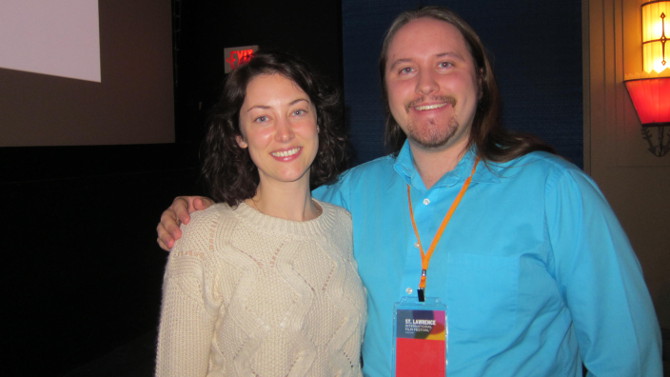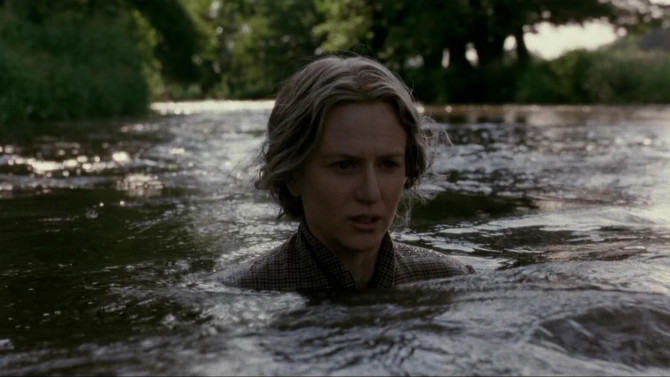Interweaving multiple stories can be a complicated thing to do. For every film that succeeds at structuring several tales into one powerful story, there are twice as many that fall flat. One movie that takes on this challenging task, tackling three separate narratives that take place in very different eras, is the 2002 dramatic motion picture The Hours.
The film features several powerhouse performances from three superb actresses (Nicole Kidman, Meryl Streep and Julianne Moore), so it is perhaps not surprising that actress Jenny Lampa, who has earned rave reviews and has received a number of acting nominations for her performance in the Swedish thriller The Break-In, selected this as one of her favourite movies.
I spoke to Lampa at the St. Lawrence International Film Festival back in October, where she and her writer/director/producer husband Marcus Ovnell screened the film to a full crowd that was captivated by it. Prior to said screening, she was gracious enough to step in front of the camera and tell me about some of the films that have influenced her. Take a look at the video offered below to hear her thoughts on The Hours, as well as another one of her favourites.
Directed with deft precision by Stephen Daldry, we watch author Virginia Woolf (a nearly unrecognizable Nicole Kidman) put her affairs in order before she walks to her death, committing suicide by placing heavy stones in the pockets of her dress – and then treads gracefully into a briskly flowing river. This is the genesis story that flows like an undercurrent through the other two narratives.
We are then introduced to a melancholic housewife named Laura Brown (Julianne Moore). Pregnant with her second child, the depressed woman struggles to deal with her own fractured psyche, unable to properly care for her loving yet oblivious husband Dan (John C. Reilly) or her wide eyed son Richie (Jack Rovello).
The third storyline follows editor Clarissa Vaughan (Meryl Streep), a woman who is also conflicted in life. She is in a loving relationship with her partner Sally Lester (Allison Janney) and has a wonderful daughter named Julia (Claire Danes), yet struggles as she cares for her former love, Richard (Ed Harris), a tortured writer who is dealing with a deteriorating body and mind.
Daldry takes us back and forth between each of the stories, divulging the complex issues that affect the lives of our three leads (all of which deal in some way with suicide). We are brought back to learn of Woolf’s mental illness as she writes ‘Mrs. Dalloway’ in the rural countryside – struggling to deal with her doctor’s diagnosis, her mocking servants, her secluded locale (on the outskirts of London), her loving husband Leonard’s (Stephen Dillane) carefully watchful eye, as well as her own demons and hidden desires. When her sister Vanessa (Miranda Richardson) arrives with her children for a weekend visit, many of these complex emotions bubble to the surface.
Laura, stuck within the role of a 1950’s housewife, also deals with depression, a complex set of mixed emotions and a hidden secret, all while reading Woolf’s novel ‘Mrs. Dalloway’. She struggles to make a cake for her husband’s birthday and then learns that her friend Kitty (Toni Collette) is going to the hospital, as they have found a growth – unleashing a surprising reaction. Shortly thereafter, she takes her son to Mrs. Latch’s (Margo Martindale) home, leaving him screaming in the yard as she drives off to a posh hotel and rents a room. This is where she contemplates her existence and whether she should take her own life.
Clarissa similarly struggles under the pressure of a complicated life. Much like ‘Mrs. Dalloway’ (Richard even uses this as her moniker), the seemingly strong individual is preparing a party for him as he has won a prestigious lifetime poetry award. Everyone is flying in for the occasion, including his former lover Louis Waters (Jeff Daniels), though the award winning author is not looking forward to the event as he is in constant anguish. Dealing with AIDS, mental illness, a crumbling body and a difficult family past, the man sees suicide as a way to permanently escape from having to trudge through the endless hours of pain that he will have to deal with over the last comfortless days of his life.
The Hours is a thought-provoking story that is woven together in a most original manner – not only looking at similar themes, but also in other intriguing and connected ways. The film deals with complex topics including ‘lost, unrequited and forbidden love’, mental illness, as well as choosing life or death. It is likely that you may catch something new or change your take on something upon a second viewing.
It features powerful, hard-hitting performances by three of Hollywood’s best. Nicole Kidman is able to capture the complicated literary figure with a beautifully nuanced performance (which she won an Academy Award for). Julianne Moore and Meryl Streep must also be commended. Each of these roles are absolutely vital to the film and these stars show why they are some of the most lauded actresses of our time. The threesome are also surrounded by a group of talented and capable actors, which makes a recipe for something very special indeed. Young Jack Rovello deserves special attention; the boy’s expressive eyes speak volumes.
The Hours is a searing drama that fuses together three powerful narratives in a unique way – carrying similar themes that echo through the generations. It features rivetting performances from a prominent cast and a breathtaking score from the extremely talented Philip Glass (the piano is powerfully moving). So, don’t fret about counting the hours before you see this motion picture – watch it today.


